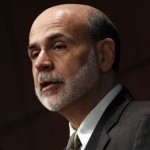What Really Keeps Bernanke Up at Night
 On 60 Minutes, Fed Chairman Bernanke was resolute in defending his own (pretty good) record. But he also revealed some larger fears about the economy.
On 60 Minutes, Fed Chairman Bernanke was resolute in defending his own (pretty good) record. But he also revealed some larger fears about the economy.
Ben Bernanke's interview with 60 Minutes Sunday showed the Fed chairman to be resolute in defending his own (pretty good) record. Reading between the lines, however, it struck me that Bernanke raised a major question that he -- and 60 Minutes interviewer Scott Pelley -- left unanswered.
To be sure, Bernanke offered a good, well thought-out, easy to understand rationale for the latest round of quantitative easing. Although the policy is far from a cure-all, it's just the medicine the economy needs. From that standpoint, one could say "mission accomplished." But there's something much more disturbing in the interview that could have used some follow up. Here's what Bernanke said in response to Pelley's question about the recovery being self-sustaining:
It may not be. It's very close to the border. It takes about two and a half percent growth just to keep unemployment stable. And that's about what we're getting. We're not very far from the level where the economy is not self-sustaining.
The obvious point here is that Bernanke thinks, despite his own rather heroic efforts, that a "double dip" recession is possible. (Yes, he also says that's unlikely.)
But the less obvious point is this: If we can have a self-sustaining recovery that doesn't really reduce unemployment -- something Bernanke's answer implicitly acknowledges -- the United States may start to develop a structural unemployment/workforce disengagement problem similar to the one Europe has coped with for several decades.
Since roughly the 1970s, the U.S. economy has outperformed those in other developed countries in large part because Americans have worked harder and more than those elsewhere. America didn't only have less unemployment, it also enjoyed a situation where more people at all skill levels worked rather than doing something else. A return to worker productivity growth after a one-quarter lull (which would be a good thing in most economic situations) means that firms may be able to drive more growth and greater profits without doing much hiring. Couple this with endless unemployment benefit extensions, new health insurance subsidies, mortgage "relief" efforts, and the like and the United States begins to look, well, a lot less American. Not a happy thought at all.